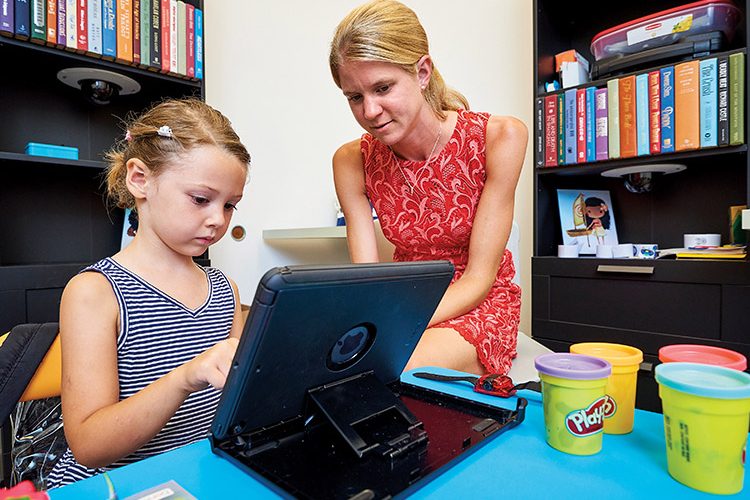Student and faculty scientists are searching for ways to improve one of the most important elements of early childhood development — sleep.
Assistant Professor of Psychological and Brain Sciences Lauren Philbrook and her student researchers Karen Aguilar ’20, of Dallas, Texas, and Kaila Daza ’21, of Easton, Pa., worked throughout the summer to conduct a number of tests with children, ages 3-5, in the Colgate Child Sleep and Physiology Lab.
“The early years are critical because there is so much happening at that level of brain development,” Philbrook says. “They’re constantly learning, so being able to consolidate that in their brains while they sleep is particularly important.”
Child participants in the study wore a device called an ActiGraph, which is similar to a Fitbit, for seven nights to track their sleep patterns. Parents filled out a lengthy questionnaire to gauge a host of potential environmental stressors ranging from neighborhood noise levels to family financial difficulties. For three days of the study, parents also collected saliva samples from their children for the researchers to measure levels of cortisol, a stress hormone that can impact sleep patterns.
“We’re looking to see how cortisol can be interfering with sleep,” Philbrook says. “If there is more stress during the day, the child’s level of cortisol may not come down at bedtime, making it more difficult to go to sleep.”
In addition, parents kept detailed logs of the times their children went to bed and woke up, and noted if their children took any medications, which could impact the sleep data. Parents also videotaped a typical bedtime routine with their children. Lastly, each child in the study participated in cognitive tests on an iPad in the sleep lab.
So far, 31 children have participated in the study, and Philbrook will continue the project into the spring semester. Preliminary analysis of the data suggests that the social and financial resources associated with living in safer and more cohesive neighborhoods and having less family economic stress are linked to more structured bedtimes and better sleep patterns among children.
“Some research is purely academic for a highly educated audience, and some research is more based in practical use for any typical person reading it,” Daza says. “Our research draws on both of these ideas, because while it is academic, we hope the knowledge will be useful and applicable for parents to create or modify bedtime routines for their children.”

